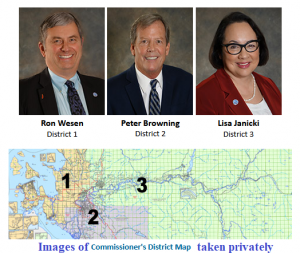Kevin Ewing says, For your information, Know your County Commissioner.
This page is dedicated to County commissioners of Skagit county.
Skagit county has three elected commissioners:
The other 7 elected positions will be addressed in future posts.

We need constitutional commissioners
Ron Wesen, District 1
Peter Browning, District 2
Lisa Janicki, District 3
Skagit county Washington has three county commissioners.
1800 Continental Place, Suite 100
Mount Vernon, WA 98273
Phone: (360) 416-1300
email: commissioners@co.skagit.wa.us
The Board of Commissioners generally meets each Monday and Tuesday for regularly scheduled agenda items. The remainder of the week is spent with individual committee assignments and constituent appointments.
Agendas are available on the web site in the “Agenda” section. Or you may listen to a recorded agenda for the upcoming week by calling (360) 416-1316.
A weekly Public Comment Period is scheduled every Tuesday at 11:30 a.m. to give the general public an opportunity to present concerns or discuss areas of interest with all three Commissioners. Skagit Peers is waiting to endorse commissioners until we are allowed an audience with them.
Simply call the Commissioners Office at (360) (360) 416-1300 and ask for Linda Hammons, the Clerk of the Board. She will arrange a mutually convenient time for you to meet with your Commissioner.
If our children are to inherit the legacy that was given to us, the right to life, Liberty and the pursuit of Happiness then we have to

Skagit Peers
make sure these rights are not sacrificed by an elected official while we sleep.
Planning Commission meetings take place every other Tuesday at 6:00 PM PST,
As of July 6, 2021, in person attendance at meetings is allowed.. You can also attend many Commissioner meetings remotely.
As per the commissioners web page;
“You can also join a Commissioner meeting remotely by dialing 1-253-8782, Meeting ID: 871 8000 1980 Passcode: 14357
Public comments can be provided by sending an e-mail to commissioners@co.skagit.wa.us or by calling the Commissioners’ office at (360) 416-1300.
The Board of Skagit County Commissioners is made up of three elected Commissioners who each serve a district of Skagit County. The Commissioners serve as the County’s legislative authority. They are responsible for adopting a balanced budget for each calendar year; adopting, amending and repealing all County ordinances; appointing members of many County boards and commissions; and overseeing the following public services:
• Public roads and public works programs;
• Public health services;
• Planning and zoning of unincorporated areas;
• Emergency Services or civil defense programs;
• County park and recreation systems
• Other services and programs, which are not clearly the responsibility of other elected County officials.
The Board of Commissioners does NOT have oversight or authority over independently elected County officials. Members of the public who have questions or issues related to the duties or business of elected officials (Sheriff, Auditor, Assessor, Coroner, Prosecuting Attorney, Treasurer, County Clerk, or District or Superior Court judges) must contact the office of that elected official.”
All elected officials are bound by law to hold meetings that you, the public, can attend in person.
Meetings held at undisclosed places or times are dubious and illegal.
Preventing the public from participating in a public meeting is a violation of your rights.
Remember: If the Constitution was sufficient for the 234 years leading up till today, we say it is a requirement from now on!

Skagit Peers Freedom
The question came up in the last Skagit Peers Meeting, “How can you tell if an elected official is constitutional? Don’t they all take the oath of office to support the constitution?”
The answer is: All elected officials take the same oath to support the Constitution and laws of the United States and the State of Washington. Most oath takers have never read the constitution.
It is easy to tell if the elected official in your county is a constitutional official;
1. He or she understands and has read the constitution,
2. Understands that only legislature can enact laws,
3. Understands that if they mandate laws, codes or edicts that is not approved by the state or federal legislatures, then the official has broken the supreme law of the land.

Skagit Peers we the people
4. Understands that when as an official they break the supreme law of the land that they lose immunity from prosecution.
5. If the official has attempted to mandate laws or enforce an invalid law, then they are guilty of violation of oath of office and they will be indicted.
If our current elected official will not meet so we can understand their constitutional position before the next election we will find alternative candidates to fill those positions.
Attend all of these meetings so discovery can be made well ahead of the next election.






